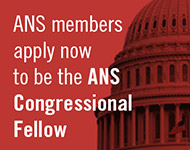ANS Congressional Fellow Begins Work for House Science Committee
Alyse Scurlock was engaged to be married when she was named Congressional Fellow in June 2018 (ANS News, July/August 2018, p. 4). A short time after her December 22 wedding to fellow ANS member and Duke Energy engineer Nathan Huffman, she relocated to the Washington, D.C., area to begin her fellowship.
Huffman's first weeks as a congressional fellow were spent meeting people and getting oriented. Then she was obliged to move once again, this time because she and her colleagues, who work on what is now the majority side of the House Science Committee, relocated to a larger office space. The move was instigated by the shift in majority control of the House following the November 2018 midterm election.
"We have a lot more work than when we were in the minority," Huffman said. "I was assigned primary and secondary issue areas, and in addition to nuclear energy within the Department of Energy, I also am working on fuel cell technology, the energy-water nexus, fusion science, hydrokinetic marine power, biological and environmental research, geothermal energy, and the list goes on."
Huffman meets with industry, national laboratory, and nongovernmental organization stakeholders within those issue areas, and she spends a lot of time preparing for hearings. In early March she led a hearing of the Energy Subcommittee on the energy-water nexus, which is also the subject of a bill-H.R. 34, the Energy and Water Research Integration Act of 2019-introduced by committee chair Eddie Bernice Johnson and ranking member Frank Lucas on January 3.
"Essentially, this issue boils down to the relationship between energy and water," Huffman explained. "It takes a lot of energy to produce water, and a lot of water to produce energy. For example, nuclear power plants use water to create power. In some areas, when the climate gets too cold or too hot, it is more difficult to obtain the water necessary to operate the plant optimally."
Huffman interviewed leaders in the field to try to find the best subject matter experts to provide testimony for the hearing.
"The rest of my time is spent working on legislation to address issues within my portfolio," Huffman said. "I must incorporate stakeholder input as best I can, and also meet with folks across the aisle and even across chambers to help give legislation the best success path forward."
Huffman believes that congressional fellowship sponsorship is very beneficial for ANS. "The American Association for the Advancement of Science fellowship program is highly regarded, and there are many previous fellows working in Congress who recognize the talent pipeline of the fellowship," she said. "I get to perform extremely important work and am given a lot of responsibility because of this relationship."
Applications for the 2020 Congressional Fellowship are being accepted through May 1.


